- Games, topic printables & more
- The 4 main speech types
- Example speeches
- Commemorative
- Declamation
- Demonstration
- Informative
- Introduction
- Student Council
- Speech topics
- Poems to read aloud
- How to write a speech
- Using props/visual aids
- Acute anxiety help
- Breathing exercises
- Letting go - free e-course
- Using self-hypnosis
- Delivery overview
- 4 modes of delivery
- How to make cue cards
- How to read a speech
- 9 vocal aspects
- Vocal variety
- Diction/articulation
- Pronunciation
- Speaking rate
- How to use pauses
- Eye contact
- Body language
- Voice image
- Voice health
- Public speaking activities and games
- About me/contact
- Speech delivery
- How many words per minute in a speech

How many words per minute in a speech?
A quick guide for slow, average and fast rates of speech.
By: Susan Dugdale
If you're preparing a speech or presentation with a strict time limit it’s useful to have an estimate of the number of words you’ll need to fit the number of minutes you've been given.
And it's even more useful to have those guidelines before you rush into writing, only to discover when you’re done, you’ve written far too much. Something I used to do on a regular basis! (And then, I had the tedious job of pruning to fit.)
What's on this page:
How many words are there in a 1-minute speech, how many words are there in a 2-minute speech, how many words are there in a 3-minute speech, how many words are there in a 4-minute speech, how many words are there in a 5-minute speech, how many words are there in a 6-minute speech, how many words are there in a 7-minute speech, how many words are there in an 8-minute speech, how many words are there in a 9-minute speech, how many words are there in a 10-minute speech, how many words are there in a 15-minute speech, how many words are there in a 20-minute speech, how many words are there in a 25-minute speech, how many words are there in a 30-minute speech.
- How to calculate your own speech rate: 2 easy methods
- How many pages is a 4, 7 or 20-minute speech?
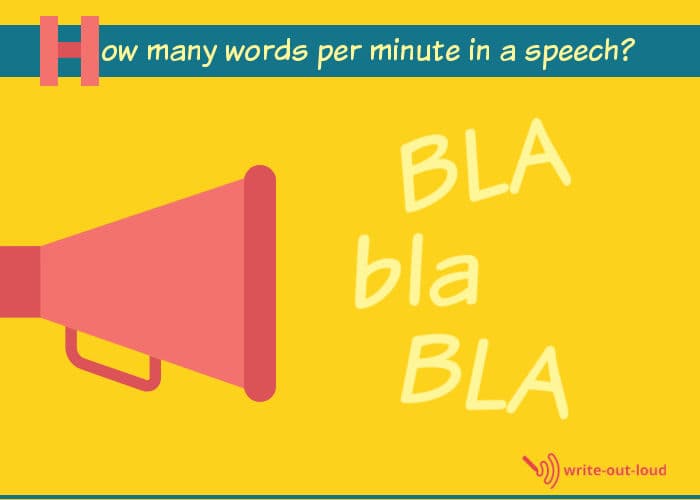
About this quick reference guide
The following table (below) shows the average number of words spoken per minute for speeches from 1 to 30 minutes long. It's a quick reference guide: one only intended to provide general information.
Who, and what, is truly average?
An average word count for any timed speech (one minute, two minutes, three, four, five, six...or more, minutes) is impossible to give. As there really is no such thing as an average person, who uses an average rate of words per minute when they speak.
We are individuals: each of us different. Speech patterns and speech (speaking) rates vary considerably between person to person for a great many reasons. The best you’ll ever get is an educated guess.
Use as an estimate: test yourself to be sure
That aside, the following estimates will give you a handy indication of the number of minutes it takes to say x number of words depending on whether you talk at a slow speed, a medium speed or you're one of the world's fast talkers.
(And, no, it's never a good idea to gabble at a mile a minute to fit everything you've prepared into the length of time you've been given!)
To be absolutely sure what you've done will fit the time allocation you've been given it's a good idea to test yourself to establish your own speaking rate or speed of speech .
How many pages is a 'x' minute speech?
Multiple variations on the question how many pages are needed for a speech are frequently asked. For instance:
- How many pages is a 4-minute speech?
- How many pages is a 7-minute speech?
- How many pages is a 20-minute presentation?
Unfortunately, the answer is not simple. Calculating the number of A4 pages of text you need for a speech of any number of minutes long is tricky for two reasons.
How many words are on an A4 page?
The first reason is that the number of words on an A4 page depends on how the page has been formatted. The answers to the questions below make a very big difference to the total number of pages needed to print a speech.
- What is the font family being used? (Different fonts take up differing amounts of space because of the shape/design of their characters.)
- What is the size of the font? (The font size you're reading right now is 20px.)
- What is the spacing between each of the letters in a word?
- What is the spacing between each line of text? Is it single spacing, 1.5 or double line spacing?
- What spacing has been set for paragraphs?
- What size have the margins of the page been set at?
- Are there headings? Sub-headings or lists?
On average if the font is plain, (sans-serif, without embellishment), like Arial or Verdana, its size is set for 12px, and the line spacing is set for 1.5, then a page may have between 400-500 words on it.
Speech rate changes how we calculate the number of words we need
The second reason why using the number of pages to gauge how long a speech will take to deliver is problematical is because we speak at different rates.
A 500-word page may take someone speaking at very slow rate 4 minutes to get through.
Another person, who has a much faster speaking rate, may take about 2.5 minutes to deliver exactly the same text.
Using the number of pages as a guide for a speech that has to fit a time limit is completely unreliable.
If you need to use a 'guesstimate' use the speech rate table below. Forget about counting the pages!
If you are a slow speaker, less than 120 words.
If you speak at an average speed between: 120 - 160 words.
If you are a fast speaker between: 160 - 200 words.
If you are a slow speaker less than 240 words.
If you speak at an average speed between: 240 - 320 words.
If you are a fast speaker between: 320 - 400 words.
If you are a slow speaker less than 360 words.
If you speak at an average speed between: 360 – 480 words.
If you are a fast speaker between: 480 - 600 words.
If you are a slow speaker less than 480 words.
If you speak at an average speed between: 480 – 640 words.
If you are a fast speaker between: 640 - 800 words.
If you are a slow speaker less than 600 words,
If you speak at an average speed between: 600 – 760 words.
If you are a fast speaker between: 760 - 1000 words.
If you are a slow speaker less than 720 words.
If you speak at an average speed between: 720 – 960 words.
If you are a fast speaker between: 960 - 1200 words.
If you are a slow speaker less than 840 words.
If you speak at an average speed between: 840 – 1120 words.
If you are a fast speaker between: 1120 - 1400 words.
If you are a slow speaker less than 960 words.
If you speak at an average speed between: 960 – 1280 words.
If you are a fast speaker between: 1280 - 1600 words.
If you are a slow speaker less than 1080 words.
If you speak at an average speed between: 1080 – 1440 words.
If you are a fast speaker between: 1440 - 1800 words.
If you are a slow speaker a little less than 1200 words.
If you speak at an average speed between: 1200 – 1600 words.
If you are a fast speaker between: 1600 - 2000 words.
If you are a slow speaker, a little less than 1,800 words.
If you speak at an average speed between: 1,800 - 2,400 words.
If you are a fast speaker between: 2,400 - 3,000 words.
If you are a slow speaker, a little less than 2,400 words.
If you speak at an average speed between: 2,400 - 3,200 words.
If you are a fast speaker between: 3,200 - 4,000 words.
If you are a slow speaker, a little less than 3,000 words.
If you speak at an average speed between: 3,000 - 4,000 words.
If you are a fast speaker between: 4,000 - 5,000 words.
If you are a slow speaker, a little less than 3,600 words.
If you speak at an average speed between: 3,600 - 4,800 words.
If you are a fast speaker between: 4,800 - 6,000 words.
Return to Top
Find out more about speech rate
- How to calculate your own words per minute speech rate - two easy methods
- The factors influencing a faster rate or slower rate of speech
- How to develop an ideal rate of speech : one matching content, speech purpose and your audience: six exercises for flexible speaking rate
Words per minute calculator
Lastly here's the link to a useful online words per minutes calculator . Once you've completed your speech enter the total number of words, and select whether you want it to give you an average for a minute of your speech at a slow rate, average or fast rate. Again, it's a 'guesstimate'. ☺
The only really safe way to find out whether your speech fits your time allocation is to say it aloud at an ideal rate or pace: one taking into account the content, and the audience who is going to listen to it, while timing it.
(Use the record function on your phone. It will assist in lots of other ways too! You'll hear where you need more vocal variety, where your pronunciation is blurred ...and, so on. It's super helpful.)
speaking out loud
Subscribe for FREE weekly alerts about what's new For more see speaking out loud

Top 10 popular pages
- Welcome speech
- Demonstration speech topics
- Impromptu speech topic cards
- Thank you quotes
- Impromptu public speaking topics
- Farewell speeches
- Phrases for welcome speeches
- Student council speeches
- Free sample eulogies
From fear to fun in 28 ways
A complete one stop resource to scuttle fear in the best of all possible ways - with laughter.

Useful pages
- Search this site
- About me & Contact
- Blogging Aloud
- Free e-course
- Privacy policy
©Copyright 2006-24 www.write-out-loud.com
Designed and built by Clickstream Designs
Do you wonder how long it takes to deliver your speech?
This website helps you convert the number of words into the time it takes to deliver your speech, online and for free. This tool is useful when preparing a speech or a presentation. The number of minutes you will take is dependent on the number of words and your speed of speech, or reading speed.
Note: This calculator provides an indication only.
Enter details below
The overview below provides an indication of the minutes for a speech (based on an average reading speed of 130 words per minute):
- Words in a 1 minute speech 130 words
- Words in a 2 minute speech 260 words
- Words in a 3 minute speech 390 words
- Words in a 4 minute speech 520 words
- Words in a 5 minute speech 650 words
- Words in a 10 minute speech 1300 words
- Words in a 15 minute speech 1950 words
- Words in a 20 minute speech 2600 words
- How long does a 500 word speech take? 3.8 minutes
- How long does a 1000 word speech take? 7.7 minutes
- How long does a 1250 word speech take? 9.6 minutes
- How long does a 1500 word speech take? 11.5 minutes
- How long does a 1750 word speech take? 13.5 minutes
- How long does a 2000 word speech take? 15.4 minutes
- How long does a 2500 word speech take? 19.2 minutes
- How long does a 5000 word speech take? 38.5 minutes
Introducing Speech Time Calculate
Estimate how many minutes your speeches, presentations, and voice-over scripts will take based on your words per minute rate!
How To Speech Time Calculate Using This Tool?
If you have a certain number of words or a piece of text you want to time, you can either type in the word count or paste the text into the provided area. This tool will then calculate how long it would take to read that text out loud.
The talk time estimate is calculated using the average speaking speed of adults, which is determined to be 183 words per minute based on scientific studies. If you’re interested in how long it would take to read silently, it’s estimated at 238 words per minute ( This data is also backed by research )
You can adjust the slider to change the words per minute value, which will affect the talk time estimate. However, the silent reading time estimate remains fixed at 238 words per minute.
For ease of use, we’ve also provided reference points for slow, average, and fast reading rates below the slider.
To begin anew, simply click the ‘clear text’ button to erase the content and restore the slider back to its original setting of 183.
Who is This Words to Minutes Converter Tool For?
If you are a student wondering how long is my essay or you’ve been tasked with writing a speech and need to know how many words to aim for and how many minutes will it take to deliver or perhaps you are a podcaster, just starting out, who wants the ability to easily synchronize music and spoken word without having to painstakingly calculate seconds between them, then this Speech Time Calculate is precisely for you!
From now on, instead of spending long hours in front of the computer trying to figure out how many seconds it takes for one phrase or section of dialogue to end and another to begin, you can let our innovative tool do all the work and convert your text to time quickly and accurately. With this powerful tool at your disposal, whether you’re giving a TED talk or just need to nail a business presentation, your life will become a little bit easier.
So keep reading to learn more about what this fantastic words to minutes converter has in store for public speakers, aspiring students, and professional radio producers alike!
Whether you want to read the text silently or speak aloud, you can use this tool as both:
- Reading time calculator
- Talk time calculator
Explanation of the Reading Time
Reading time refers to the duration it takes for an average person to read a written text silently while still comprehending its content. Based on an extensive analysis of 190 studies that involved 18,573 participants , research conducted by Marc Brysbaert in 2019 suggests that the typical silent reading speed for an adult individual is approximately 238 words per minute .
To convert word count to read time for a specific text, you can do so by dividing the total word count of the text by this established value of 238. Here is the mathematical equation for determining the duration of reading time in minutes:
Reading Time = Total Word Count / 238
Explanation of the Speech Time
Speech time refers to the duration it takes for an average person to read a text out loud. Based on data from 77 studies involving 5,965 people , it’s been found that most adults read aloud at a speed of approximately 183 words per minute ( research conducted by Marc Brysbaert in 2019 ). To figure out how long it will take to read a specific piece of text aloud, you can divide the total number of words in the text by this average rate of 183 words per minute.
Of course, it’s important to note that talk time can vary depending on factors such as clarity of speech, pauses for emphasis, and use of visual aids. However, using this tool for converting the number of words to minutes can still provide a helpful guideline for planning and practicing your presentation. By having a better understanding of speech rates, you can ensure that your message is delivered effectively and efficiently.
Benefits of Using a Speech Time Calculate
Time management in presentations.
Effective time management during presentations is crucial to ensure the audience remains engaged and the information is accurately conveyed. This is where our words to speaking time converter comes in handy. By using this tool, presenters can easily determine how many words they need to include in their presentation to stay within the allotted time frame.
Not only does it help with time management, but it also ensures that the pacing of the presentation is consistent, making it easier for the audience to follow. With the use of this presentation time calculator, presenters can confidently deliver their presentations without the worry of running over time or rushing through it.
Estimated speech time for public speaking
Public speaking can be nerve-wracking, especially when you have too little or too much information to fill your time slot. You wonder only if there were an accurate public speaking time calculator available so that you could be able to allocate the appropriate amount of time to each section of your presentation, ensuring that you cover all the necessary points without rushing or going over time.
Effective pacing is key in ensuring your message is delivered with clarity and impact.
Most public speakers target an average of 130-150 words per minute for their spoken content, meaning you should aim to limit your speaking time to roughly one minute per 130-150 words. While this may take some practice to achieve, the end result is a confident, well-timed delivery that keeps your audience engaged from start to finish.
Remember, in public speaking, less is often more—take your time to breathe and emphasize key points. Your audience will appreciate your thoughtful and measured approach. For that, you can use this tool and adjust your words to speech time.
Accurate estimations for audiobooks and podcasts
As more and more people turn to audiobooks and podcasts for their entertainment and information needs, accurate estimations of listening time have become more important than ever. After all, there’s nothing worse than settling in for a quick listen only to find yourself trapped in a story that goes on for hours longer than you anticipated.
That’s why it’s great to see publishers and podcast producers taking estimated reading time seriously, providing listeners with the information they need to choose the right content for their schedule. Whether you’re looking for a quick listen on your daily commute or a lengthy distraction for a lazy Sunday afternoon, accurate estimations using this words to speak time calculator make it easier than ever to find the perfect content.
Some Popular Speech Times
how many words in a 2 minute speech
Almost 300 words
how many words in a 3 minute speech
Almost 450 words
how many words in a 4 minute speech
Almost 600 words
how many words in a 15 minute speech
Almost 2250 words
The speech time is calculated taking 150 words per minute as reference value
Common conversions (average speed)
How long does it take to read 500 words?
3.8 minutes
How long does it take to read 750 words?
5.8 minutes
How long does it take to read 1000 words?
7.7 minutes
How long does it take to read 1200 words?
9.2 minutes
How long does it take to read 1500 words?
11.5 minutes
How long does it take to read 1800 words?
13.8 minutes
How long does it take to read 2000 words?
15.4 minutes
How long does it take to read 3000 words?
23.1 minutes
As the world becomes more fast-paced, time is a precious commodity. Determining how long your script will take to read, whether for a presentation or a video, can make a significant difference in engaging and retaining your audience’s attention.
That’s where our Words to Time Converter comes in handy. It’s a valuable tool for anyone working in various professions, from broadcast journalists to teachers to executives. No matter the industry, time is of the essence, and knowing how long your speech or presentation will take is crucial for effective communication.

- Recommended Gear
- Beginner info
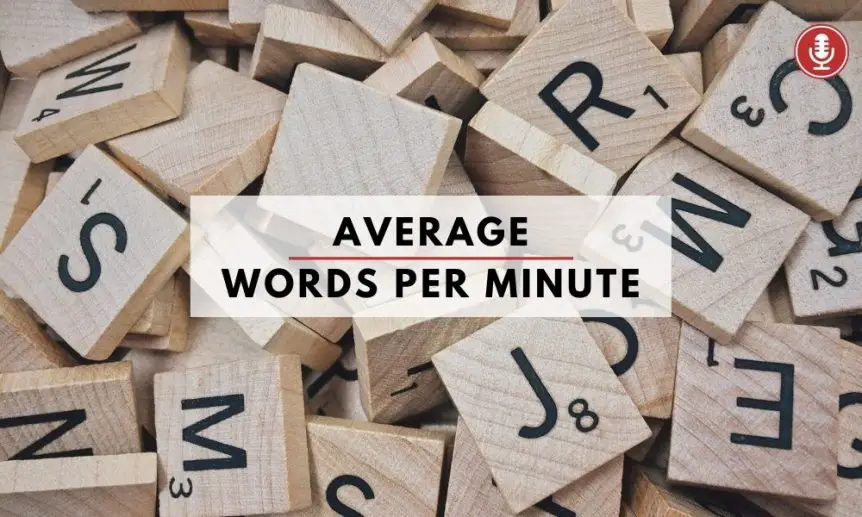
Average Words Per Minute Speaking (15 Experts Examples)
Post Content
What is the average words per minute speaking rate?
According to the National Center for Voice and Speech , the average rate for English speakers in the US is about 150 wpm. The average speaking rate can change for your project. Especially some professionals are known to speak faster purposeful ly.
Average words per minute speaking rates vary for different jobs and projects:
As you can see, presentations and conversational word per minute rates are lower. Those are situations where we care deeply about being understood. But also we have pauses and body language to capture the attention.
Ebook publishers recommend the 150-160 wpm, which is close to the maximum speaking rate that also ensures full comprehension.
150-160 words per minute (WPM) is also recommended for podcasts, radio hosts, and even YouTubers. This should be average for an entire show, while some of the passages should use a faster speaking rate while others slower. A smart adjustment will break the monotony and increase listener engagement.
On the fastest spectrum, there are auctioneers and commentators. Their job is to increase the hype, convey passion, and trigger a lot of emotions.
We also cover the topic of how fast should you talk on a recording in this podcast episode:
Examples of average words per minute speaking rates by public figures
Analyzing transcripts of great and popular TED talks given by public figures, we checked how fast they talk. Talks are linked so you can check them, and they cover a variety of topics.
For these 14 talks, the average speaking rate is 167 words per minute.
The Steve Jobs talk was not delivered as part of a TED conference, but it is included on the TED website. Above all, it is an excellent example of attention capturing and message delivery.
The fastest talker on the list, Tony Robbins, still delivers his message with clarity, and we can understand what he is saying. He achieves this by clearly articulating his words and using a simple language. His clarity compensates for his speed.
Your’ words per minute speaking rate should be perfectly adjusted to how fast people can listen and comprehend. If it is going to be too fast, you are going to lose a listener. If you are going to be too slow, their thoughts will drift away. The words per minute rate on your project should be just right.
The obvious question now is what is the “right” work per minute rate. In this article, we will discuss statistics, real-life examples, and present recommendations for making the most engaging recording.
Most people can talk quite fast when needed. Stress and other factors also can make us speed up. But it is essential to focus and slow down to speak perfectly for our audience. But always speaking at the same rate can also be too monotonous.

Can you control how fast we speak?
Definitely yes. According to professional speech coach Joan Detz:
“President John F. Kennedy was a notoriously fast talker – often topping 200 words per minute. You certainly don’t want to be that extreme. But, in general, talking a bit fast is better than talking too slow. Why? Speed projects charisma. Slowness projects lethargy and can frustrate listeners.” – “It’s Not What You Say, It’s How You Say It.”
But for his most famous speech, his 1961 Inaugural Address, he slowed down significantly. He slowed his usually high speaking rate down to below 100 wpm. JFK projected command, vigor, and charisma.
He achieved this using short sentences and action words. He had a focused message and he coveying it in an active voice.
JFK’s words per minute count was “Just Right” for the moment and the audience. Being this a live speech, he had some tools we don’t. He could pause, use facial expressions and body language, and keep attention focused on him.
We can’t do this effectively during a voice-over, but there are methods to capture attention and reach optimal words per minute.

Is the average words per minute speaking rate important?
In short, yes, it is very important. Your rate of speech has an impact on how the audience perceives you and your message.
The speed of our speech affects comprehension, clarity, and customer experience.
- Comprehension is essential if you want your audio to be satisfying to your listeners and, most importantly if you genuinely want to help them. Working on improving your comprehension ensures that people that came looking for your show will find the answers quickly and won’t have to search the web for better and more valuable materials.
- With clarity , you increase your listeners’ focus, and you can help them learn and get a better result with your call to action. Clarity will allow you to get rid of the filler words. It keeps you focused on the topic. You will quickly cut away the redundant materials.
- Customer experience will get you more good reviews, recommendations, and sales in the long run.
When you nail your target WPM, you will start improving your language. You will remove empty words that don’t enhance meaning. Words that get overused are: literally, really, just, wrap my head around, etc.
Improved language, more precise communication, and clearer message simply mean there is more value in your podcast for your listeners.

How to calculate your average words per minute speaking rate?
Words per minute (wpm) is the most common way used to determine a speaking rate.
The calculation is simple and obvious. Just take the number of spoken words and divide by the number of minutes it took you to deliver the speech.
Speaking Rate (WPM) = Total words / number of minutes
There is one more way to calculate the speaking rate, but since it is harder to figure, it is not as popular as WPM. This other way is syllables per minute (SPM), and you get it by dividing the number of syllables spoken by the length of a speech.
Speaking Rate (SPM) = Total syllables / number of minutes
Let’s review this short example of how those numbers differ and what they can tell us about our speech.
- Ask not what your country can do for you; ask what you can do for your country.
- Modern, sophisticated presenters using expressive vocabulary can project passion and enthusiasm, thus successfully increasing listeners’ engagement.
Both passages have 17 words. But the first one has 19 syllables while the second one has 45 syllables. If you speak them both at the same words per minute rate, the longer passage will appear faster because you are saying more.
Using shorter words can help you say more in the same amount of time without sounding rushed.
How to easily check your average words per minute speaking rate?
To do it exactly, you need to memorize a passage and record yourself. Make a few tries speaking faster and slower to get different WPMs and determine when you sound the best.
You can also approximate this by reading a passage. It, however, calculates reading and not speaking rate. The familiarity of the material can impact the reading rate, so take this under consideration.
Reading rate, however, can be useful if you will be relying a lot on the script.
What influences how fast you talk on your audio project?
Many factors influence how fast you can talk . The good thing is that you can easily control the majority of these factors and achieve the speed you need for the most significant impact.
- Regular speaking rate – this is highly influenced by our culture, and how people talk around. Along with a speaking rate, also pronunciation gets shaped thought the course of our lives. Thankfully all this can be influenced by a conscious effort.
- Fatigue – whenever you are tired, you will speak slower. This is a natural response of the brain that you slow down when you are tired. Not only speaking is impacted. The simple answer here is to schedule your recording sessions in advance so you will be well-rested.
- New and complex content – when you will be working off a script that was completed a long time ago and is no longer familiar to you and on top contains a lot of long and complicated words. You will deliver it much slower. To avoid it, simply rehearse before recording and simplify. You can streamline your recording but splitting long sentences and using a more straightforward language.
Alongside being relaxed and prepared, other techniques can also help you sound better. Even what you drink and at what time of the day you record your voice-over can have an impact. Check here for a full list of tips to sound better: vocal tips

How to use pauses effectively for better content delivery?
Pauses are a great way to capture attention during a speech. You have to use them smartly and strategically to engage your audience fully.
When you make natural pauses, you automatically slow down your average words per minute speaking rate. In return, you should get more clear delivery and capture listeners’ attention.
Using pauses during a recording is a bit different than when giving a live speech. For example, on a podcast, you can always remove unwanted stops and keep only those you wish to include.
In a recording, you should use pauses to:
- Indicate a change in tone or topic – use a pause if you want to change the mood from excitement to being more calm and reflective. Or use one if you will change what you are talking about and ease the progression of the story. Adding music can help with changing tone.
- Emphasize key points – if you are reaching a conclusion or discuss some turning point in your story, you can pause to show that a critical piece is going to be addressed. Use those pauses in each episode to highlight the value you are delivering.
- Improve clarity of your message – when you are getting into the most convoluted part of your episode, slow down. This will give time to your listeners to process and fully appreciate the most complex and difficult to follow part of your speech.
How to control your words per minute rate on your project?
Control your environment and record your project in a soundproofed recording room . Using a quiet studio and planning your recording sessions will allow you to avoid distractions. This will help you with your speaking rate since:
- Adding control removes stress – having a controlled environment, and the scheduled session will allow you to speak more freely as it will remove some pressure. This will enable you to talk faster.
- Controlling your environment removes distractions – a soundproofed room guarantees no outside noises will lose your focus and break your concentration.
Controlling your schedule and understanding how noisy is your surroundings can help you get better audio and speak at the desired WPM even if you don’t have a fully soundproofed studio. Simply follow our guidelines on how to record in a bad room .
Is it better to speak faster, or is it better to speak slower?
There is no gold standard. If you are anywhere between 140-170 WPM, you should sound great.
Generally, slower is more intelligible than faster speech. Appropriate pauses allow your audience time to digest what you’ve said and begin to process it.
Instead of obsessing about WPM, make sure your overall delivery is on point.
Put additional effort into:
- Simplification – use simple language, eliminate filler words, remove complex vocabulary and phrases to become more understandable
- Clarity – focus on diction, removal of vocal inflection, sharp pronunciation, and breathing.

How to practice average words per minute speaking pace?
The simplest and most effective way to practice keeping a constant pace is by using a metronome. You can buy one online (it’s a cool office decoration) or simply download any free app for your phone.
The metronome’s role is to tick at a specific rate and provide you with a constant rhythm. This is just for practicing as if you would talk precisely to the beat of the metronome you would sound very monotone (like voice assistants do).
But practicing with a metronome will help you to oscillate at your desired words per minute rate.
There are many free metronome apps for Apple and Android phones, so you won’t have any issues finding one (you don’t need the premium versions).

How to Use Rate of Speech Effectively?
There are two valuable studies to help you craft your voice that talk about precipitation formed based on a rate of speech.
- In 1976 psychologists looked at speech rate and persuasion and concluded that faster speakers (195 wpm) were more persuasive than slower speakers (102 wpm). The results of this study suggest that speech rate functions as a general cue that augments credibility.
- However, in 1991 a study on rapid speech suggested a more complicated relationship. Researchers conclude that when messages were in general disagreement with the audience’s views (counter-attitudinal), fast-talking increased persuasion. On the other hand, when the audience inherently agreed with the message (pro-attitudinal), slow speech emerged as the most persuasive way of delivery.

There is only one thing to do: vary your speaking rate
Always vary your words per minute speaking rate within one recording.
Don’t deliver all the sentences at the same rate. It will improve your delivery, and allow you to convey both meaning and emotions. Adjust the speed to match what you want to project at the moment.
Varying your WPM will make your recording more interesting for the audience. Without pace variation, you will sound monotone.
Change your speed according to what you want your listeners to feel.
- Speaking fast expresses passion, urgency, excitement, and emotion
- Talking slow expresses importance, sadness, confusion, the seriousness of a point
Tip : There is one more trick I use to control better my talking speed. I manage how close or far I’m from my dynamic mic.
What Playback Speed Is Used for Podcasts?
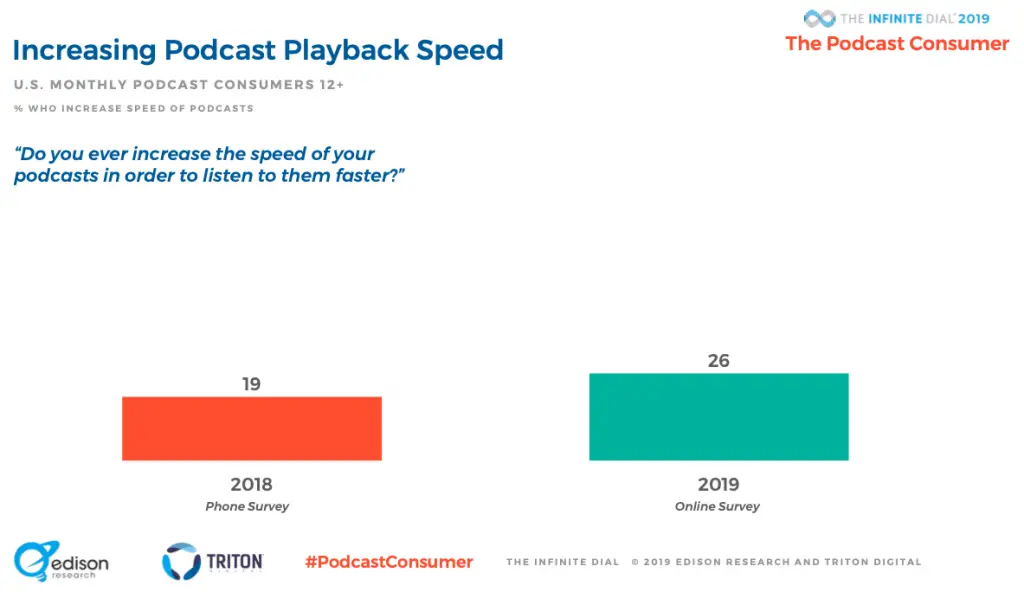
Surveys show that one of the podcasting trends is that, an increasing number of listeners regularly use higher than 1x playback speed to listen to podcasts.
The podcast player Pocket Casts estimates the feature has saved its listeners a cumulative 2,849 years between 2015 and 2019.
It may be an indication that busy people actually may enjoy a bit higher than average WPM rate.
How long should your script be for the best words per minute impression?
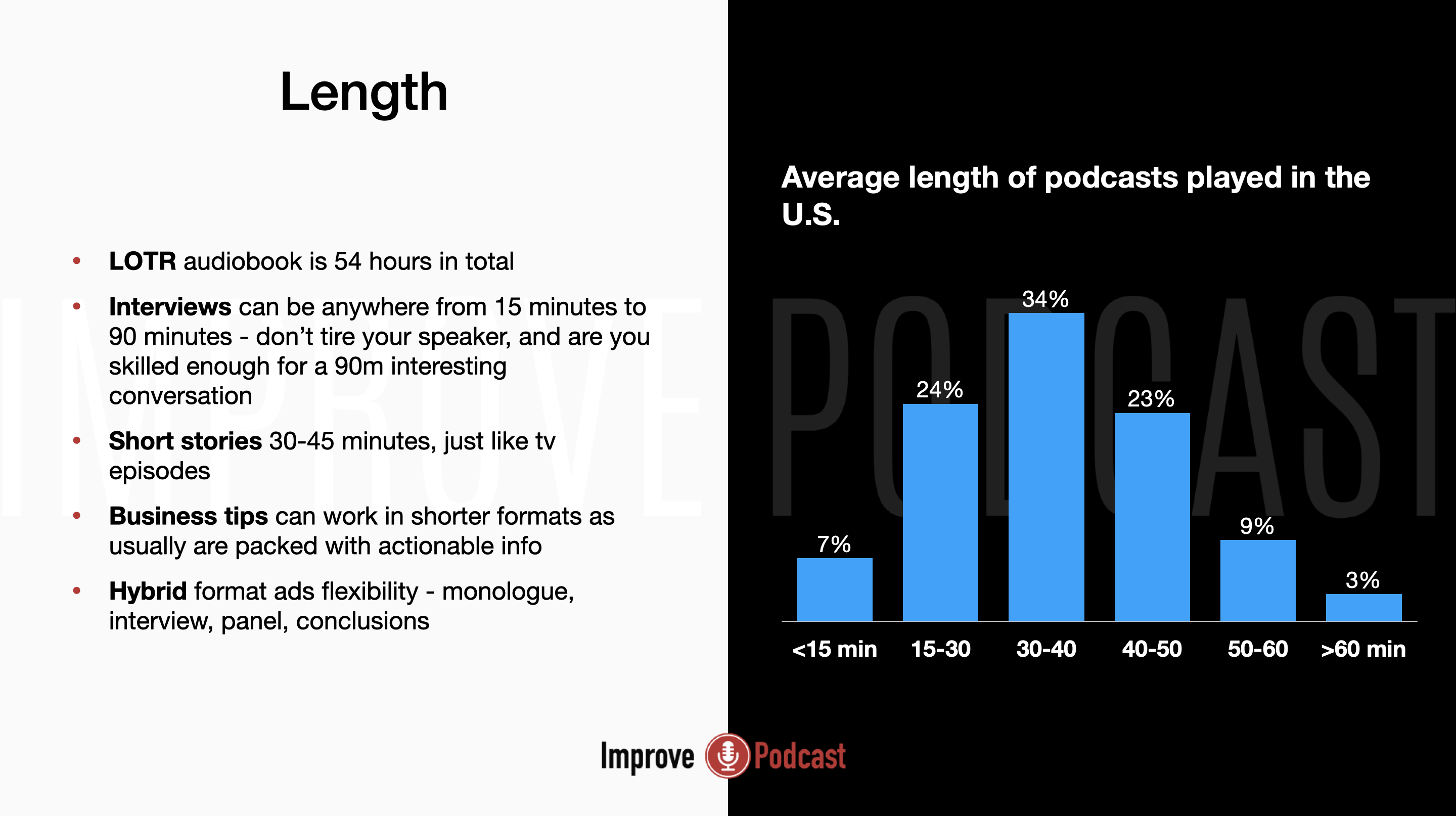
From analyzing podcast listeners’ demographics and usage patterns, we know that people mostly listen to podcast shows lasting between 30 and 40 minutes.
Experiment and measure your time to find the best way for you but start with a script of about 150-160 words per minute. In this case, start and experiment with:
- 2000 words for 15 minutes episode
- 3000 words for 20 minutes episode
- 4500 words for 30 minutes episode
We know that people mostly listen to podcasts between 30 and 40 minutes, but also take under consideration their attention span.
TED talks aim to be about 18 minutes. According to TED’s chief Chris Anderson, it is “long enough to be serious and short enough to hold people’s attention.”
Information have material simply is harder and harder to digest as it goes on, so it is less satisfying for the listeners.
It is essential to care about quality and user experience with controlling the WPM speed. There are also other ways to improve the quality of your show. Besides, words per minute control my two favorites are thorough idea research and getting the best podcasting gear .
In conclusion
- 150-160 words per minute rate is the most typical speed at which radio and podcast host speak
- Many good speakers on TED lecture also talk close to this rate
- There is no golden solution and many speakers successfully deliver messages speaking above this rate
- Vary your speaking rate to avoid becoming monotone
- Speak faster to show more excitement and enthusiasm and speak slower to show importance and focus
- Alongside WPM rate a good speaker should also focus on clarity and simplicity
- A most common technique to train speaking rate is practicing with a metronome
- If you want to speak clearly and at a constant rate make sure you are rested, prepared for the recording, familiar with the material and record in a controlled and soundproofed environment
- Currently, people often use faster playback speeds to listen to podcasts. Consider this trend and test out how your audience will react to you, talking 10-20% faster.
Did you measure you average words per minute speaking rate? What did you found to be most effective for your project?
About the Author

I'm the owner and creator of ImprovePodcast.com, the site dedicated to providing actionable solutions for podcast creators. My goal is helping people to develop their podcasts into effective marketing and sales tools.
Very helpful! Thanks. This will help me with my pacing and script preparation!
Very helpful. I’ve adjusted my words per minute based on this article! Thanks.
I have no idea when this was written, but it’s rare to be searching the internet for new and useful information. I searched for “How many words per minute for a podcast” hoping to come across something that I might be able to adapt to my question. Wow. This article is everything I was asking for and more. You list famous Ted Talk speakers (interesting my two favorite Simon and Tony are 170/180. I think I found my model). Thank you for the effort on this. I will subscribe to this site.
I’m always happy to help.
Leave a Reply Cancel reply
Your email address will not be published. Required fields are marked *
Speaking time calculator
Type or paste your speech to instantly calculate your speaking time
How does this speech timer work
To begin, delete the sample text and either type in your speech or copy and paste it into the editor.
The average reading speed and speech rate is 200 words per minute and is the default setting above. Once you paste your speech, click “Play” and Speechify will analyze your speech by the number of words and generate a time to speak it at the default rate.
You can listen to your speech in various accents or languages. If you are aiming for a specific timeframe for your speech, click edit to either increase or decrease the number of words to see how long it would take to speak them.
You can also increase or decrease the speaking rate to gauge how fast or slow you should speak in order to get to a specific time with the number of words you have in your speech.
To get to that perfect word count to fit with the speech length time, you’ll have to keep editing between words per minute (WPM) and number of words.
The best part is that you can share your speech in audio format to your friends, relatives, or peers to review it. They can simply click play and listen to your speech.
Frequently Asked Questions
How many words are there in a 1 minute speech.
Based on the average speed of speech, there are 150 words in a 1 minute speech.
How many words are there in a 2 minute speech?
There are 300 words per minute in a 2 minute speech. 2 minutes isn’t a long time so when you speak, you could endure the average speaking rate.
How many words are there in a 3 minute speech?
On average there are 450 words in a 3 minute speech. This is based on the average speech rate of 250 words per minute. At the 3 minute mark, even a novice speaker could keep going at the rate they started – with some practice.
How many words are there in a 4 minute speech?
On average there are 600 words in a 4 minute speech. This is based on the average speech rate of 250 words per minute. Still, even a novice speaker could maintain the 150 words per minute rate. Try it in the Soundbite above. Set your words per minute and speak along to see if you could endure consistency over 4 minutes.
How many words are there in a 5 minute speech?
On average there are 750 words in a 5 minute speech. This is based on the average speech rate of 250 words per minute. While this is simple math, we after all are humans and 5 minutes can be pushing the boundaries of a consistent speech tempo and words per minute.
How many words are there in a 10 minute speech?
In a 10 minute speech aim for 1000 words. The math might tell you 1,500 words but consider your speech. You might need pauses, rest for your voice, dramatic effects, and perhaps even audience interaction. Also, it becomes quite difficult to endure a consistent 150 words per minute speech rate for 10 minutes. Consider your listeners. We doubt very few people would want to listen to a precisely 150 words per minute speech for 10 minutes. It wouldn’t be engaging. And in a speech, you should engage and communicate.
Speechify is the #1 text-to-speech reader
Install anywhere and sync your data everywhere
Speechify Chrome extension
Listen to any text on your laptop or desktop. Read aloud with the Speechify text-to-speech extension for Chrome.
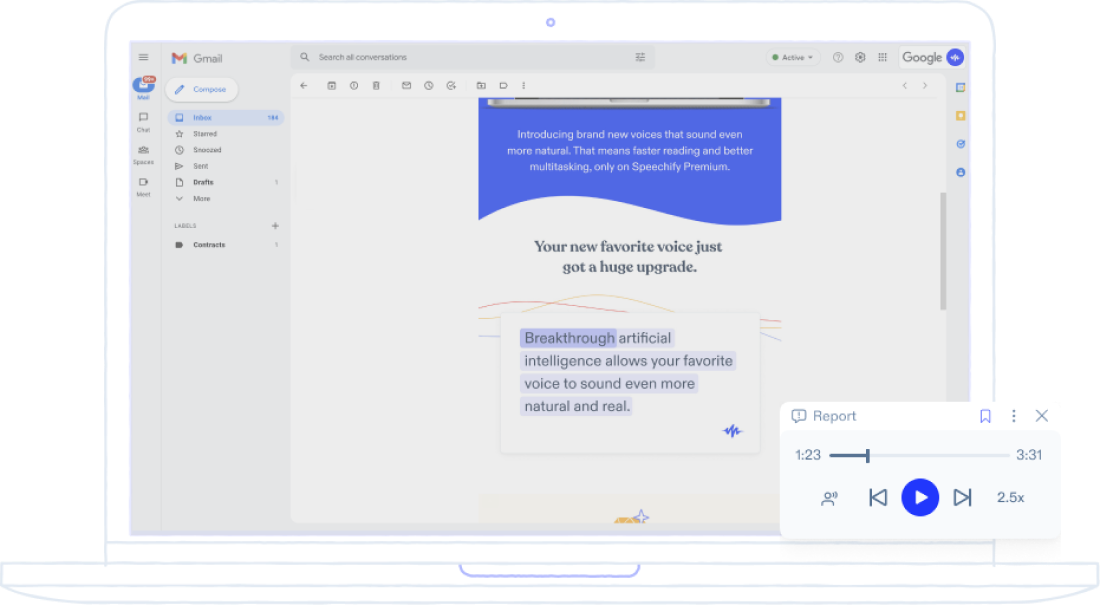
Speechify for iOS
Get the #1 rated app for text-to-speech in the App Store. Speechify can read books, documents, and articles while you cook, work out, commute, or any other activity you can think of.
Speechify Android app
Speechify is a text to speech (tts) screen reader that can read any text, PDF, document, book, email, file, or article online out loud on your phone.
Only available on iPhone and iPad
To access our catalog of 100,000+ audiobooks, you need to use an iOS device.
Coming to Android soon...
Join the waitlist
Enter your email and we will notify you as soon as Speechify Audiobooks is available for you.
You’ve been added to the waitlist. We will notify you as soon as Speechify Audiobooks is available for you.
Average Words Per Minute Speaking: Why It Matters
Wired Clip is a reader-supported site. Purchases made through links may earn a commission (at no cost to you). We appreciate your support. Learn more .
- Last Updated On: March 24, 2024
Understanding your speaking pace can unlock new levels of communication effectiveness and personal insight. While many overlook the importance of speaking speed, it plays a crucial role in connecting and conveying our messages to others.
This exploration delves into the nuances of your average speaking rate, providing actionable advice to refine your verbal delivery and overall presentation skills.
Let’s explore the common pitfalls in speech delivery and master the art of impactful communication, backed by research indicating that influential speakers adjust their speed to match their message and audience.
📝 Key Takeaways
- 📊 Ideal speeds vary from 100-150 WPM for presentations to 250-400 WPM for commentators.
- 🕰️ Time yourself reading aloud to identify your average pace and areas for improvement.
- 📈 Your cultural background, confidence, and public speaking comfort significantly impact your speaking speed.
- 💻 Practice, feedback, and technology can help you fine-tune your speaking rate for clearer communication.
What Is The Average Words Per Minute For Speaking?
One may wonder, “How many words does the average person speak per minute?”
The average speaking rate is 150-160 words per minute (WPM) for podcasters. This can vary with context and individual differences, ranging from 110-250 WPM . Radio presenters or podcasters may speak faster than the average rate.
Average Words Per Minute (WPM) by Speaking Context:
Words to minutes calculator – podcast episode timing.
Planning your podcast episode ? Use this simple calculator to determine how long your script will take to deliver. Enter your script length and choose your average speaking speed.
Get results instantly to help manage your episode timing perfectly. This free tool is great for podcasters who want to plan their episodes and keep their audience engaged.
How to Determine Your Speaking Rate
Calculating this and adapting your average WPM can greatly enhance communication skills and ensure effective information delivery.
- Select a passage or piece of text that is around 200-300 words long. This length is ideal because it’s long enough to get an average rate but short enough to be manageable.
- Before you start reading, set a timer. Smartphones usually have a stopwatch function that works perfectly for this.
- Read the passage out loud, just as you would in a conversation or presentation. Do not rush or deliberately slow down; aim for a natural pace.
- Once you’ve finished reading, stop the timer and note down the time taken.
- To determine your speaking rate in words per minute (WPM), divide the number of words in the passage by the time taken in minutes to read it.
- Your speaking rate can vary depending on context, mood, or the complexity of the content. Repeating the process with different types of passages (e.g., technical content vs. casual conversation) might help you get a range of your average speaking speed.
- If your speaking rate is too fast or slow for your intended audience or purpose, practice adjusting it. Using a metronome can help maintain a consistent pace.
- Sometimes, we do not judge our speaking pace best. It can be beneficial to get feedback from peers or mentors. They can provide insights into whether you’re speaking too fast, too slow, or just right.
- Several apps and online tools can automatically calculate your speaking rate by analyzing a recorded speech sample.
Remember, while determining your speaking rate is useful, paying attention to clarity, intonation, and enunciation is also essential. The goal is to communicate effectively; sometimes, that might mean adjusting your pace to ensure comprehension.
Speaking Rate (WPM) of Professional Speakers
The average speaking rate of professional speakers is 167 words per minute (WPM).
It’s important to note that while Steve Jobs’ talk isn’t from the regular TED conferences, it’s featured on the TED website. This presentation, given by the late visionary, is a masterclass in capturing the audience’s attention and delivering a poignant message.
Tony Robbins, the fastest speaker on our list, epitomizes that speed need not compromise clarity. His crystal-clear articulation and lucid language ensure his message is understood, irrespective of the brisk pace.
Speakers must adjust their speaking rate to match their audience’s listening comfort . Racing through content might lose listeners, while a languid pace could let their attention drift. The art lies in striking that perfect equilibrium.
Optimal Script Length for Podcast Episodes
As podcasting continues to gain traction as a favored medium for content delivery, understanding the ideal script length for varying episode durations can be invaluable.
The table below provides a guideline for scriptwriters and podcasters to ensure content remains engaging and concise for listeners.
By aligning the script length with the intended duration, creators can better plan, structure, and deliver their content for maximum impact. Dive in to discover the recommended word count for your next episode!
➡️ How Long Should a Podcast Be ?
Factors That Influence The Speed Of Speech Of The Average Person
Many factors influence the speed at an average person speaks, including:
The Culture You Were Raised In
It might sound crazy, but the culture you were raised in can significantly impact your average speaking speed. Some cultures and languages naturally speak much faster than others, which can seriously impact your average WPM.
If you grew up speaking a first language that is naturally fast-paced, such as Spanish or Italian, then it is likely that you will speak at a faster rate than someone who grew up speaking a language with slower speech rates, such as English.
Slower speakers might take two seconds to say a word, while faster speakers could say the same in half a second. This difference may not seem like much, but it can increase over time. If you speak for five minutes, you will likely say twice as many words as the slow speaker.
Additionally, if you are used to hearing the average person speak quickly, you may find adjusting to slower speech patterns difficult. Slow speakers can often be frustrating for natives who speak faster, who may find themselves impatient or lost.
The good news is that you can learn to speak slower if necessary, no matter your natural speech rate.
Just remember to take your time and focus on speaking rather than worrying about the number of words you say. With practice, you can find the perfect balance for you.
How Confident You Feel
Your confidence level also has a huge effect on your speaking speed. If you feel confident, you’ll naturally speak slower and more evenly than if you feel insecure.
If you are nervous, you are more likely to rush your speech with faster-than-average speaking speed and trip over your words. A good speaker can control their speed and use it to their advantage.
World Fastest Speaker
Stephen Peter Woodmore (13 December 1959 – 6 February 2023) was a British salesman recognized for his extraordinary speech speed, articulating at 637 words per minute (wpm) — four times faster than average.
From August 1990, he held the Guinness World Record for the world’s fastest talker, succeeding John Moschitta Jr. However, in 1995, Sean Shannon from Canada surpassed him with a speed of 655 wpm.
How Comfortable You Are With Public Speaking
Finally, your comfort level when speaking in public can significantly impact your speaking rate. If you are not used to being in front of large groups of people, you may struggle to keep up a steady pace, thus speaking faster and rushing your speech.
Good speakers, such as those from popular Ted talks, often have extensive practice and experience in public speaking , which has helped them become more comfortable and confident when addressing large audiences.
Tips To Improve The Speed Of How The Average Person Speaks
As you can see from our list above, several different aspects affect the speed of your speech. However, there are some simple things that you can do to improve your speaking rates.
Slow Down When Talking About Difficult Topics
When discussing difficult topics, such as politics or religion, it is important to think carefully about what you say. If you speak too quickly, you risk making mistakes and sounding awkward .
Instead, try to speak slowly and deliberately, and make sure that you pause between each sentence.
Practice Before Giving Presentations
Practice makes perfect, and this applies to speaking as well. If you plan on giving a presentation, practice speaking slowly and pausing frequently.
Avoid rushing through your speech and focus on getting all your points across without any mistakes. This will help you feel more confident and relaxed and allow you to speak more easily.
➡️ Which Lapel Mic For Podcast Should I Choose?
Practice Reading Out Loud
Reading aloud is one of the best ways to improve your talking speed because it forces you to slow down and pay attention to how you speak, especially when reading complicated words.
It also helps you to learn to control your breathing , another factor affecting your speaking speed.
Speak Clearly And Slowly
You should always aim to speak slowly and comfortably—even if you are nervous. If you speak too fast, you are more likely than ever to trip over your words, increasing your stress levels and mental fatigue.
As we mentioned earlier, nerves can cause you to breathe faster, so take note of your breath rate and try to slow it down slightly.
Take Deep Breaths
Taking deep breaths before talking will help you relax and give you time to prepare for your presentation. People speak more quickly when nervous or anxious, so it is essential to stay calm.
If you are tackling complex content, it can be helpful to slow down your thoughts by taking a few moments to pause and think about what you want to say before speaking. This will help you organize your thoughts and ensure you say what you want.
Taking deep breaths will also help you calm down, reduce the chances of you tripping over your words, and maintain a regular speaking rate.
Why Does Speaking Speed Matter?
When you are speaking publicly, the speed of your speech is important and can offer you several advantages when delivering a speech. These include:
Increasing Your Credibility
If you have a high speaking rate, you risk sounding like you are trying to convince everyone around you that you know what you are talking about.
Many speakers would want to avoid this, but if you speak at an appropriate pace, you can be seen as credible and trustworthy.
Radio hosts and TED Talk speakers are known for speaking slowly and deliberately, which helps them engage the audience and build trust .
Improving Your Audience’s Attention Span
Speaking too quickly can cause your audience to lose interest. They may find themselves nodding off or looking bored, meaning they won’t pay close attention to what you say.
By contrast, speaking slowly lets them listen carefully and absorb everything you say.
➡️ How To Make Your Podcast Popular ?
Avoiding Slips Of The Tongue
Speaking too quickly can make you more likely to slip up and accidentally say something embarrassing.
For example, if you talk about your favorite movie and say, “I love watching movies with my friends,” you could say, “I love watching movies alone.” This slip-up is unacceptable, and it is easy to see why.
FAQs: Average Words Per Minute Speaking
How fast does the average podcaster speak.
The average podcaster speaks approximately 150 to 160 words per minute, while the average professional speaker is slightly higher at 167 WPM (words per minute).
How Fast Does the Average Person Talk?
The average person speaks at a rate of approximately 125 to 150 words per minute.
How many words is a 5 minute speech?
A 5-minute speech would be around 750 to 800 words using the average speaking rate.
Is 100 words per minute fast speaking?
Speaking at 100 WPM is slightly below the average conversational rate, so it’s not considered fast.
Is 150 wpm speaking fast?
Speaking at 150 WPM is about average for most people, especially in presentations and general conversations.
Is speaking 200 words a minute fast?
Speaking at 200 WPM is faster than average and is typically seen in enthusiastic or rapid conversations.
How long is a 700 word speech?
A 700-word speech would last roughly 4.5 to 5 minutes at an average speaking rate.
Is 150 words per minute good for a speech?
Yes, 150 WPM is a good rate for a speech as it’s comfortable for listeners and ensures clarity.
Is it possible to speak 300 words per minute?
Speaking at 300 WPM is extremely fast. While some individuals, like certain record-holders, can achieve it, it’s beyond the average speaking rate for most people and can challenge comprehension.
How long is a 2 minute speech?
A 2-minute speech is typically 300 to 320 words, based on an average speaking rate of 150-160 words per minute (WPM).
Final Thoughts On How Many Words You Can Say Per Minute
Your speaking speed isn’t fixed; it can change with time. Utilizing our guidelines, you can determine your words-per-minute rate and refine your speech to be more composed, captivating, and effective for your listeners.
Other sources :
- Science Focus
Share This Post
More To Explore
Home Podcasting: Guide to a Pro Setup
Riverside FM Promo Code: Exclusive Podcasting Discounts
Joe Rogan New Spotify Deal 2024: Worth Up to $250 Million

The Role That Pace Of Speech Plays In Delivering A Presentation
Table of contents.
Have you ever put an audiobook or podcast on 2x speed and tried to keep up with the speaker’s pace? Or, have you ever watched an episode of Gilmore Girls and been shocked at how fast Rory and Lorelai talk to each other?
If so, you understand how much affect speech pace can have.
Whether in conversation or in a presentation, the pace of your speech can have a huge impact on how listeners engage and respond to what you say.
In this blog, we will take a look at speech pace, what a good public speaking pace is, why it’s important, and how to find your pace.
Before we jump into the article, check out our portfolio of projects.
When We Say 'Pace Of Speech', What Do We Mean?
When we refer to the pace of your speech, it usually means how fast you are speaking, or how many words per minute you are speaking.
A normal pace – often a conversational pace – usually sits between 120-150 words per minute . Some professions, like auctioneers, professional debaters, and sports commentators’ pace of speech typically ranges from 200-450 words per minute.
The Guinness book of World Records has Sean Shannon from Canada as the current record holder for the fastest talker , with a rate of 655 words per minute.
S peech rates vary from person to person and can often be too fast/too slow depending on the person and the situation.
For example, individuals may speak faster when they want to demonstrate urgency or when they are anxious. On the other hand, they might speak slower on more somber and serious occasions, to speak for dramatic effect, or to reiterate an important point.
Why Is The Pace In Which Your Speak Important?
The pace at which you speak is important when it comes to your audience’s ability to understand what is being said. Additionally, you should vary your pace throughout in order to emphasis key moments in your information in your presentation.
If you talk fast, your audience may have a hard time understanding what you are saying. On the other hand, if you speak at a slow pace, your listeners may lose interest or stop paying attention.
While you might vary your pace throughout your conversation or presentation, be sure to consider your audience as you set an engaging pace.
What Does Your Speech Pace Indicate?
Your speaking rate (and your body language!) can indicate different things to your audience. The art of pacing is an important skill that public speaking professionals will learn and refine over years of perfecting their craft.
Let’s look at the effects that speaking fast or slow might have.
Speaking Slowly

Speaking slowly can indicate a somber and serious tone. It can also indicate that the speaker is unsure of what they are saying and can be paired with filler words like um, uh, or like.
Additionally, a slower pace can also happen when the speaker takes pauses for dramatic effect or to give the audience time to digest new information.
Speaking Quickly
Alternatively, if the presenter is speaking quickly, this could indicate a sense of urgency, passion, excitement, and emotion. If you speak quickly, it might also mean that you are nervous and want to rush through your presentation.

How Can You Tell If You're Speaking Too Fast, Or Too Slow?
If you’re the one speaking, it might be difficult to figure out if you are speaking too fast, slow, or just right. As we’ve said above, your speaking rate can have an effect on how your audience perceives you and engaged with your presentation material.
Keeping an eye on your audience participants is key to determining if your speech rate is appropriate. If you’re audience looks disengaged, bored, or tired, you may be speaking too slow.
On the other side, if your audience looks confused or lost throughout your entire talk, you may be speaking faster than the average rate.
What Impact Does The Wrong Speed Have When Public Speaking?
While you might think that things like the speed of your talking voice might now matter, the wrong speed can actually have quite the impact.
Using a regular speaking rate is one of the best ways to talk to your audience. Talking too fast or slow can help make a point, but shouldn’t be used throughout the entire talk. In fact, this, along with other common presentation mistakes , can have an impact on the audience’s perception of your business.
A good speaker can leave a lasting impression on your audience and can lead to more sales, higher interest, and more connections.
You Need To Find Your Own Speech Rate
In order to become a better presenter , you will need to practice and find your speech rate.

How Can You Find Your Pace?
You can find out whether you are talking to fast, too slow, or just right by timing the speed of your talking rate.
T he speech rate is determined by adding up the total words you speak per minute.
For example, if you record your talking voice for one minute and count the number of words you speak, you can find your speech rates.
This process may need a few tries and different lengths of time to nail down. You might even practice going through your entire speech and then determining your speech rate when listening to it. Not only will this help you practice your presentation, but it can help with finding a good pace.
There are a few apps you can use that can help you track your speech pace as you prepare for your presentation. Some of these apps include Preply, Orai, and Ummo.
How Do You Perfect Your Pace?
Like any skill, it’s all about practice. The best public speakers are skilled with words and their voice. They know how to bring excitement, build suspense with a pause, capture an audience in one word, and can hear the differences between paces of speech.
A great public speaker will master the conversational range of speech, know when to use pauses, and can speed up or slow down their speech based on what they are saying in that moment.
Through regular practice and recording your presentations, you will be able to hone the craft of public speaking and regulating your pace. You’ll also be able to determine the perfect length of a presentation, including t he number of slides you should include to keep your audience engaged.
Here Are Our Final Thoughts On Pace Of Your Speech During A Presentation
A great presentation will use various speech paces to keep audiences engaged, highlight key pieces of information, and show excitement or passion. Understanding your pace will help you become a better presenter and public speaker.
Are You In Need Of A World Class Presentation? You've Found Us!
A good public speaker and presenter needs a great slide deck! If you’re ready to up your presentation game, you’ve come to the right place!
At PresentationGeeks , we know the value that a slidedeck provides to a presentation. Our team of design experts have years of experience creating captivating presentation slides that will grab your audience’s attention and keep them informed.
Want to learn more? Contact us today!
Author: Content Team
Related posts.


FREE PROFESSIONAL RESOURCES DELIVERED TO YOUR INBOX.
Subscribe for free tips, resources, templates, ideas and more from our professional team of presentation designers.

Speech calculator: how long does it take to deliver your speech?
With this speech calculator, you can easily calculate how long it will take you to deliver a speech.
How many words per minute?
In the English language, people speak about 140 words per minute. A fast speaker will get to 170 words per minute, a slow speaker will use around 110 words.
Professional speechwriters use this speech calculator to find out how long a speech takes.

Copy your full text and paste it in the box below:
The entire analysis happens within your browser. The text will NOT be stored and NOT be sent over the web.
Word count:
Your speech rate:
Speech duration:
FAQ’s
How many words is a 3 minute speech .
A speaker with an average speaking speed will need 420 words for a 3 minute speech. A fast speaker will need 510 words while a slow speaker will only need 330 words.
How many words is a 5 minute speech?
A speaker with an average speaking speed will need 700 words for a 5 minutes speech. A fast speaker will need 850 words for the same speech length. A slow speaker will only need 550 words.
Is this a word count calculator?
The speech calculator is a word count calculator. Insert your text and the tool will automatically calculate the word count. It will then also calculate the speech length depending on the selected talking speed.
How to best select the right speaking speed?
Fast, average or slow? The answer depends on the speaker, the speech type and the speech setting.
The speaking speed of the speaker
Some speakers are natural fast or slow speakers. The best speakers keep a variance during their speeches. They speed up to keep momentum and slow down to put special emphasis on other parts.
The speech type
The type of speech matters a lot in selecting the right speech speed. If you read the whole speech word for word from paper then your average speech speed will be lower. If you intend to use the written speech as speaker notes then your average speaking speed will be much higher.
The speech setting
An informal setting will have a faster average speaking speed compared to a more formal setting.
Keeping all three factors in mind you will able make a better judgement about selecting the right speech speed in the speech calculator.
- January 2024
- August 2023
- January 2021
- December 2020
- October 2020
- September 2020
- Client case
- Persuasion tip
Debatrix is a leading expert in (remote) persuasive communication. Based in Europe, we offer executive coaching, persuasion consulting and trainings on TED-worthy presenting, how to influence and inspire, storytelling, debating, framing and dealing with difficult questions.
We value your privacy
Privacy overview.

Convert Words to Time
Calculate how long it will take to read a speech or presentation
Enter the word count of your speech below to see how long it will take you to read. Estimate the number of minutes based on a slow, average, or fast speaking pace.
Number of words
Reading speed, common conversions (average speed).
honestcalculator

Words Per Minute Calculator
How to use word per minutes calculator.
I will tell you step by step how to use this calculator.
Let’s see how to use it.
- You select your “Word per minutes (wpm)” correctly.
- You select your “Slow, Medium, Fast” correctly.
- Click on Calculate Button .
- Congratulations! You can see your Words Per Minute Results.
Table of Contents
How fast can I read (WPM)?
In order to speak properly in front of an audience, you need to understand how your own speaking pace should be. Average speed for speaking English is usually 130WPM.
You can follow this method to check your reading speed or speaking speed like:
- Set to 60 minutes,
- You start speaking or reading English.
- Stop! And see how many words you are using
This simple method will help you choose the speaking speed.
How many words are you using in how many minutes?
A very simple rule can determine how many words you have used or not.
For example: If you spoke in 10 minutes and your average speed is 130WPM, how many words did you use?
Number of words = WPM * Time
= 1300 words
Then we can easily calculate how many words we have used in how many minutes by this formula. And using our word per minute calculator will improve time and quality of life
Charts for WPM speech , podcast, radio, simple speech, fast, slow , medium or other speech ratio ?
Normal Speech/Presentation:
Range: 120-150 WPM
This is the typical speed for everyday conversation and presentations.
Range: 150-160 WPM
Podcasts often aim for a slightly faster pace to maintain listener engagement.
Radio Broadcasting:
Range: 150-180 WPM
Radio hosts may vary their speed based on the format and target audience.
Slow Speech:
Range: 100-120 WPM
Used for emphasis, clarity, or when speaking to an audience that may have difficulty understanding faster speech.
Fast Speech:
Range: 180-200+ WPM
Used for energetic presentations, advertisements, or when conveying a sense of urgency.
Medium Speech:
Range: 150-170 WPM
Strikes a balance between the clarity of slow speech and the engagement of fast speech.
It’s important to note that these are general guidelines, and the optimal WPM can vary based on factors such as the speaker’s natural pace, the audience’s familiarity with the topic, and the overall context of the communication. Additionally, individual preferences and cultural norms can influence what is considered an appropriate speaking speed.
Chose Your Calculator
How to Create an Engaging 5-Minute Presentation
Published: September 15, 2023
A 5-minute speech can feel both incredibly short and infinitely long.

While this short format encourages audiences to pay more attention, presenters often struggle to fit everything into five minutes even as they navigate nervousness that seems to stretch out each second.
As a result, preparation is key for 5-minute speech success.
But how can you ensure your presentation accomplishes everything it needs to within just five short minutes? We’ve put together an (appropriately condensed) guide on five-minute presentations to help you get started.
![words per minute for a presentation → Free Download: 10 PowerPoint Presentation Templates [Access Now]](https://no-cache.hubspot.com/cta/default/53/2d0b5298-2daa-4812-b2d4-fa65cd354a8e.png)
How many words are in a 5-minute presentation?
A five-minute presentation is approximately 700 words long. The average person speaks 120 to 160 words a minute, which means the average five-minute presentation is 600 to 800 words.

10 Free PowerPoint Templates
Download ten free PowerPoint templates for a better presentation.
- Creative templates.
- Data-driven templates.
- Professional templates.
You're all set!
Click this link to access this resource at any time.
To calculate your own personal speaking speed (words per minute, or WPM):
- Make an audio recording of yourself speaking for one minute.
- Use a free transcription service to generate a text version of your speech.
- The number of words you spoke in that minute is your personal WPM.
When constructing a longer presentation, you might be more concerned about transitions and keeping the audience engaged with more extensive narrative elements.
In a short presentation, everything you say should directly tie back to your central premise and further advance your main point.
Keeping a tight scope and using your words carefully ensures your time isn't wasted and the audience leaves with a clear, singular takeaway.
How many slides are in a 5-minute presentation?
Five or six slides, or about one per minute, is a good baseline for a 5-minute presentation. Depending on your subject matter, however, you might use up to 20 slides and spend about 10 or 15 seconds on each.
More important than your slide count is what each slide contains. It‘s a good rule of thumb to keep your slides simple and focused on visuals instead of text for a presentation of any length.
This becomes especially important when you’re dealing with a condensed presentation window.
Trying to cram in as much information as possible within a short time frame can be tempting. Resist the urge. Instead, focus on simple, clean visuals that all tie back to your central premise.
You can also use these free presentation templates to arrange your slides in a way that makes the most sense for your delivery and the content of your presentation.

Don't forget to share this post!
Related articles.
![words per minute for a presentation How to Write an Ecommerce Business Plan [Examples & Template]](https://blog.hubspot.com/hubfs/ecommerce%20business%20plan.png)
How to Write an Ecommerce Business Plan [Examples & Template]
![words per minute for a presentation How to Create an Infographic in Under an Hour — the 2024 Guide [+ Free Templates]](https://blog.hubspot.com/hubfs/Make-infographic-hero%20%28598%20%C3%97%20398%20px%29.jpg)
How to Create an Infographic in Under an Hour — the 2024 Guide [+ Free Templates]
![words per minute for a presentation 20 Great Examples of PowerPoint Presentation Design [+ Templates]](https://blog.hubspot.com/hubfs/powerpoint-presentation-examples.webp)
20 Great Examples of PowerPoint Presentation Design [+ Templates]

Get Buyers to Do What You Want: The Power of Temptation Bundling in Sales
![words per minute for a presentation How to Start a Presentation [+ Examples]](https://blog.hubspot.com/hubfs/how-to-start-presenting.webp)
How to Start a Presentation [+ Examples]
![words per minute for a presentation 17 PowerPoint Presentation Tips to Make More Creative Slideshows [+ Templates]](https://blog.hubspot.com/hubfs/powerpoint-design-tricks_7.webp)
17 PowerPoint Presentation Tips to Make More Creative Slideshows [+ Templates]

120 Presentation Topic Ideas Help You Hook Your Audience
![words per minute for a presentation How to Create the Best PowerPoint Presentations [Examples & Templates]](https://blog.hubspot.com/hubfs/Powerpoint%20presentation.jpg)
How to Create the Best PowerPoint Presentations [Examples & Templates]

The Presenter's Guide to Nailing Your Next PowerPoint
![words per minute for a presentation How to Create a Stunning Presentation Cover Page [+ Examples]](https://blog.hubspot.com/hubfs/presentation-cover-page_3.webp)
How to Create a Stunning Presentation Cover Page [+ Examples]
Marketing software that helps you drive revenue, save time and resources, and measure and optimize your investments — all on one easy-to-use platform

Words To Time Converter
Estimate how many minutes your speeches, presentations, and voice-over scripts will take based on your words per minute rate!
Words per Minute: 183
How To Convert Words to Minutes Using This Tool?
If you have a certain number of words or a piece of text you want to time, you can either type in the word count or paste the text into the provided area. This tool will then calculate how long it would take to read that text out loud.
The talk time estimate is calculated using the average speaking speed of adults, which is determined to be 183 words per minute based on scientific studies. If you’re interested in how long it would take to read silently, it’s estimated at 238 words per minute ( This data is also backed by research )
You can adjust the slider to change the words per minute value, which will affect the talk time estimate. However, the silent reading time estimate remains fixed at 238 words per minute.
For ease of use, we’ve also provided reference points for slow, average, and fast reading rates below the slider.
To begin anew, simply click the ‘clear text’ button to erase the content and restore the slider back to its original setting of 183.
I. Who is This Words to Minutes Converter Tool For?
If you are a student wondering how long is my essay or you’ve been tasked with writing a speech and need to know how many words to aim for and how many minutes will it take to deliver or perhaps you are a podcaster, just starting out, who wants the ability to easily synchronize music and spoken word without having to painstakingly calculate seconds between them, then this words to time converter (or speech time calculator-you may call it if you are a public speaker) is precisely for you!
From now on, instead of spending long hours in front of the computer trying to figure out how many seconds it takes for one phrase or section of dialogue to end and another to begin, you can let our innovative tool do all the work and convert your text to time quickly and accurately. With this powerful tool at your disposal, whether you’re giving a TED talk or just need to nail a business presentation, your life will become a little bit easier.
So keep reading to learn more about what this fantastic words to minutes converter has in store for public speakers, aspiring students, and professional radio producers alike!
Whether you want to read the text silently or speak aloud, you can use this tool as both:
- Reading time calculator
- Talk time calculator
II.I Explanation of the Reading Time
Reading time refers to the duration it takes for an average person to read a written text silently while still comprehending its content. Based on an extensive analysis of 190 studies that involved 18,573 participants , research conducted by Marc Brysbaert in 2019 suggests that the typical silent reading speed for an adult individual is approximately 238 words per minute .
To convert word count to read time for a specific text, you can do so by dividing the total word count of the text by this established value of 238. Here is the mathematical equation for determining the duration of reading time in minutes:
Reading Time = Total Word Count / 238
II.II Explanation of the Speech Time
Speech time refers to the duration it takes for an average person to read a text out loud. Based on data from 77 studies involving 5,965 people , it’s been found that most adults read aloud at a speed of approximately 183 words per minute ( research conducted by Marc Brysbaert in 2019 ). To figure out how long it will take to read a specific piece of text aloud, you can divide the total number of words in the text by this average rate of 183 words per minute.
Of course, it’s important to note that talk time can vary depending on factors such as clarity of speech, pauses for emphasis, and use of visual aids. However, using this tool for converting the number of words to minutes can still provide a helpful guideline for planning and practicing your presentation. By having a better understanding of speech rates, you can ensure that your message is delivered effectively and efficiently.
III. Benefits of Using a Words to Time Converter
Time management in presentations.
Effective time management during presentations is crucial to ensure the audience remains engaged and the information is accurately conveyed. This is where our speaking time converter comes in handy. By using this tool, presenters can easily determine how many words they need to include in their presentation to stay within the allotted time frame.
Not only does it help with time management, but it also ensures that the pacing of the presentation is consistent, making it easier for the audience to follow. With the use of this tool, presenters can confidently deliver their presentations without the worry of running over time or rushing through it.
Estimated speech time for public speaking
Public speaking can be nerve-wracking, especially when you have too little or too much information to fill your time slot. You wonder only if there were an accurate public speaking time calculator available so that you could be able to allocate the appropriate amount of time to each section of your presentation, ensuring that you cover all the necessary points without rushing or going over time.
Effective pacing is key in ensuring your message is delivered with clarity and impact.
Most public speakers target an average of 130-150 words per minute for their spoken content, meaning you should aim to limit your speaking time to roughly one minute per 130-150 words. While this may take some practice to achieve, the end result is a confident, well-timed delivery that keeps your audience engaged from start to finish.
Remember, in public speaking, less is often more—take your time to breathe and emphasize key points. Your audience will appreciate your thoughtful and measured approach. For that, you can use this tool and adjust your words to speech time.
Accurate estimations for audiobooks and podcasts
As more and more people turn to audiobooks and podcasts for their entertainment and information needs, accurate estimations of listening time have become more important than ever. After all, there’s nothing worse than settling in for a quick listen only to find yourself trapped in a story that goes on for hours longer than you anticipated.
That’s why it’s great to see publishers and podcast producers taking estimated reading time seriously, providing listeners with the information they need to choose the right content for their schedule. Whether you’re looking for a quick listen on your daily commute or a lengthy distraction for a lazy Sunday afternoon, accurate estimations using this speaking time calculator make it easier than ever to find the perfect content.
IV. Some Popular Speech Times
V. conclusion.
As the world becomes more fast-paced, time is a precious commodity. Determining how long your script will take to read, whether for a presentation or a video, can make a significant difference in engaging and retaining your audience’s attention.
That’s where our Words to Time Converter comes in handy. It’s a valuable tool for anyone working in various professions, from broadcast journalists to teachers to executives. No matter the industry, time is of the essence, and knowing how long your speech or presentation will take is crucial for effective communication.
Speech Rate Calculator
Calculate your speech rate based on the given inputs
Share results with your friends
Speech analysis often involves understanding speech rate and speech length. Our speech rate calculator pairs effectively with the speech length calculator , aiding in speech analysis and delivery.
How to Use the Speech Rate Calculator
The Speech Rate Calculator is a user-friendly tool designed to measure your speech rate. Speech rate refers to the speed at which you speak and is typically measured in words per minute. By calculating your speech rate, you can assess the efficiency and effectiveness of your delivery, adapt your pace to suit different audiences, and make necessary adjustments to improve your overall communication skills.
Primary Applications of the Calculator
The Speech Rate Calculator has several primary applications, including:
- Presentation Preparation: When preparing for a presentation, it's crucial to estimate your speech rate to ensure you stay within the allocated time frame. The calculator helps you determine if you need to adjust the length or content of your speech.
- Public Speaking Events: Whether you're delivering a keynote address, participating in a panel discussion, or giving a TED Talk, understanding your speech rate can enhance your stage presence and enable you to connect better with your audience.
- Podcast Recording: Podcasters can benefit from the Speech Rate Calculator to maintain a consistent and engaging pace throughout their episodes. It allows hosts to deliver information effectively and capture listeners' attention.
Instructions for Utilizing the Calculator
To utilize the Speech Rate Calculator effectively, follow these simple instructions:
- Speech Duration (in minutes): Enter the duration of your speech or the time allocated for your presentation. This value should be provided in minutes.
- Word Count: Enter the total number of words in your speech or the script you plan to deliver. If you're unsure about the exact count, you can estimate it using word processing software or online tools.
- Language: Select the language in which you will be delivering your speech. Choose from English, Spanish, or French.
- Audience: Choose the appropriate audience category for your speech. Select from General if your speech targets a broad audience, Technical if it focuses on specialized knowledge or industry-specific terminology, or Academic if it is aimed at an academic audience.
- Notes: This field is optional but can be used to include any additional information or reminders related to your speech.
Once you have filled in the required input fields, click the Calculate Speech Rate button to obtain the results.
Output Fields and Interpretations
After clicking the Calculate Speech Rate button, the Speech Rate Calculator will generate the following output fields:
- Speech Duration (in minutes): This field displays the speech duration you entered, reaffirming the provided information.
- Word Count: This field shows the total word count you entered, ensuring accuracy.
- Language: The selected language is displayed in this field, indicating the language in which your speech is delivered.
- Audience: This field reflects the audience category you chose, helping you consider the appropriate tone and level of complexity for your speech.
- Notes: If you included any notes, they will be shown in this field, serving as a reminder or reference for your speech preparation.
- Speech Rate: The calculated speech rate will be displayed in this field. It represents the number of words you are estimated to speak per minute, rounded to two decimal places.
Speech Rate Calculator Formula
The Speech Rate Calculator utilizes the following formula to determine your speech rate:
Speech Rate = Word Count / Speech Duration
In plain English, the speech rate is calculated by dividing the total word count of your speech by the duration of the speech in minutes.
Illustrative Example
Let's consider an example to illustrate the usage of the Speech Rate Calculator:
Suppose you have a 10-minute presentation and your speech consists of 1,500 words. You enter these values into the calculator, select English as the language, and choose the General audience category. Additionally, you include a note reminding yourself to speak slowly and emphasize key points. After clicking the Calculate Speech Rate button, the calculator generates the following results:
- Speech Duration (in minutes): 10
- Word Count: 1,500
- Language: English
- Audience: General
- Notes: Speak slowly and emphasize key points
- Speech Rate: 150 words per minute
Based on this example, the calculator estimates that you would speak at a rate of 150 words per minute during your presentation.
Illustrative Table Example
Suppose we have a table with multiple rows of example data, showcasing various speech durations and word counts. The Speech Rate Calculator can help us determine the speech rate for each scenario. Here is an example table:
In the table above, the Speech Rate Calculator was used to calculate the speech rates for different scenarios, taking into account varying speech durations, word counts, languages, audiences, and additional notes.
The Speech Rate Calculator is a valuable tool for anyone involved in public speaking, presentations, or podcast recordings. By understanding your speech rate, you can adjust your delivery to engage your audience effectively. By following the instructions outlined in this article and utilizing the calculator, you can enhance your communication skills, improve your speech pacing, and ensure your message resonates with your listeners.
About the Author

Shuvo Shaha Python Developer
Shuvo Shaha is a skilled Python developer with expertise in developing efficient and user-friendly web applications. He is passionate about writing clean and maintainable code and is always exploring new technologies to improve his skills. With a strong background in computer science, Shuvo has experience working with a variety of frameworks and libraries, including Django and Flask. He is a collaborative team player who is dedicated to delivering high-quality work on time and on budget.

Presentation Time Calculator
PT Time Controller
보다 정확하게 측정하고 싶다면, Customize를 이용하세요.
1. If you scroll right or left, it will calculate PT time according to corresponding speed. 2. You can consider your speech speed and the interval of your PPT pages .
140 WPM (Words Per Minute)
* 매우 천천히 설명하는 발표는 330 CPM까지도 내려갑니다.
1. Read your script for 20 seconds using below stopwatch. 2. Enter the script as much as you just read and it will calculate PT time about total script. 3. If you have PPT, enter the number of PPT pages, the interval of PPT pages and the time to view materials.
2021.03.18. Modified